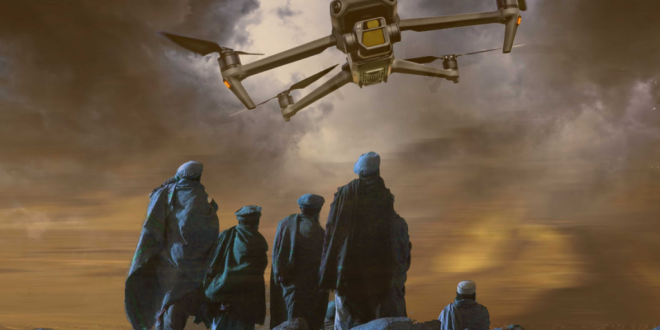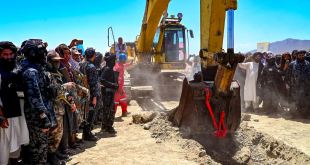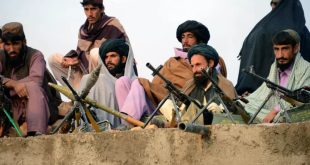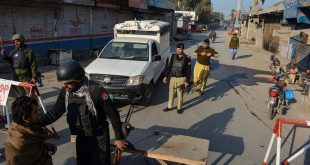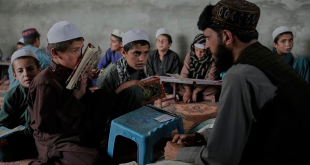
By: Rafiullah Anwari
On August 3 this year, a quadcopter drone attacked the “Miryan” police station in Bannu, located in Pakistan’s Khyber Pakhtunkhwa province, wounding two officers. This was one of several drone attacks on the station in recent months and reflects the growing trend of using explosive drones against Pakistani government security forces in the area.
Police officers fired at the drone upon spotting it but failed to bring it down, and it retreated toward the “Baka Khel” area. The fact that armed groups now have access to drone technology shows that the battlefield between states and armed groups is undergoing fundamental changes.
A few weeks earlier, on July 18 and 19, the Miryan police station was targeted by drone attacks twice; the first attack wounded two security personnel, while the second caused no injuries.
On July 10, militants used a drone and explosives to attack a police vehicle and counterterrorism forces in the “Noraar” area, injuring one soldier and damaging the vehicle. The attackers fled using drones after the clash.
On July 9, two separate drone attacks occurred in Bannu—one killed a woman and injured three children, while the other damaged the solar panels of the Miryan station. These successive drone strikes signal a serious alarm for Pakistan’s security and highlight the rise of new threats in the country.
According to Pakistani security officials, in the two months leading up to July 20, at least eight drone attacks were carried out against military installations in Bannu and surrounding areas by Islamist groups from northwestern Pakistan. Pakistani officials identify Tehrik-i-Taliban Pakistan (TTP) as the main perpetrator of these attacks. For the first time in Pakistan’s history, radical militants have used guided aerial vehicles to target government forces. The roots of this shift go back to years of TTP military activity and collaboration with terrorist groups in the border regions.
Birth of TTP in Pakistan
The emergence of TTP is directly linked to the fall of the Taliban regime in Afghanistan in 2001 and the subsequent U.S. invasion. Following the attack, thousands of Taliban and al-Qaeda members fled to Pakistan’s tribal areas, especially Waziristan and parts of Khyber Pakhtunkhwa and Balochistan.
Before the official formation of TTP in 2007, many of its fighters operated in scattered local groups that had already declared opposition to the Pakistani government. In December 2007, Baitullah Mehsud, a powerful commander from South Waziristan, formally founded TTP as an umbrella organization for various local militant groups. A consultative council of about 40 local militant leaders was formed to coordinate activities in the tribal areas and Khyber Pakhtunkhwa. The TTP leadership lacked formal religious education, though they used religious rhetoric. The group adhered to the Deobandi ideology and pursued three main goals: enforcing Islamic Sharia law, waging jihad against the U.S. and NATO in Afghanistan, and conducting military operations against the Pakistani government.
Some local commanders, such as Hafiz Gul Bahadur and Mullah Nazir, were reluctant to attack the Pakistani army. At the time, the TTP was a decentralized, fragmented network whose decisions blended broad ideological goals with local tribal interests.
In 2013, after the killing of Hakimullah Mehsud, leadership passed to Mullah Fazlullah, a Taliban leader from the Swat region. However, since he was not from the Mehsud tribe, he was seen as an “outsider” by tribal fighters, undermining the group’s legitimacy and internal cohesion.
TTP Operations and Attacks
During roughly two decades of official activity under its current name, TTP has carried out numerous attacks. According to the Global Terrorism Database, between 2007 and 2009 the group was involved in 269 attacks, most in the Federally Administered Tribal Areas (FATA) of Khyber Pakhtunkhwa.
After the Taliban regained power in Afghanistan, given Pakistan’s extensive support for them, it was expected that TTP activity might decline. However, comparing the group’s early years with the period after the Taliban’s return shows that its operational scope has actually expanded.
Afghanistan’s Taliban: “Pakistan Throws Snow from Its Own Roof onto Others”
Islamabad, long accused of supporting Afghanistan’s Taliban, now describes them as the main backers of TTP. Pakistani officials have repeatedly stated that “anti-Pakistan groups,” including TTP, freely use Afghan territory to launch attacks inside Pakistan. Taliban officials in Afghanistan have repeatedly rejected these claims, saying, “Pakistan throws the snow from its own roof onto others.” They insist they do not allow any terrorist or armed groups to threaten other countries.
Suicide Attacks
On January 30, 2023, a deadly explosion in a mosque used by police forces in Peshawar killed and wounded more than 100 people. The attack, which occurred during midday prayers and in the front rows of worshippers, was one of the bloodiest assaults on a place of worship in Pakistan in recent years. In the hours immediately after, a TTP-affiliated individual named Sarbakaf Mohmand claimed responsibility.
About 10 hours later, TTP’s official spokesperson, Muhammad Khurasani, denied any role in the bombing, stating that targeting mosques, schools, and religious centers was against the group’s policies. He warned that those responsible for such acts would face disciplinary action under the group’s internal rules. However, no explanation was given as to why an earlier claim of responsibility had been made by a member.
Pakistan’s Inability to Defeat TTP
Since the start of its war against TTP, Pakistan has conducted several large-scale military operations but has never been able to completely stop the group’s activities. At best, it has temporarily weakened them. Statistics also show that TTP activity has increased since the Taliban took power in Afghanistan.
Pakistani officials have repeatedly tried to get Afghanistan’s interim government to mediate talks with TTP, but Kabul has consistently said it has no ties with anti-Pakistan groups, including TTP, and considers the issue an internal Pakistani matter.
In the latest effort, on July 21 this year, Pakistan’s Interior Minister Mohsin Naqvi met with Sirajuddin Haqqani, the Taliban’s Interior Minister, to request joint action against terrorist groups. According to Pakistan’s Express Tribune, Naqvi’s office stated after the meeting: “Terrorist organizations cause unrest and instability; we must stop them together.” The Pakistani Interior Ministry said both sides discussed bilateral relations—particularly focusing on counterterrorism, border control, and TTP—and reached an agreement on dealing with the group.
Tribal Jirga for Peace
A few days later, on August 2, the first round of peace jirga talks with TTP members was held in Mamund, Bajaur district. Local tribal leaders demanded that if TTP intends to fight, it must leave populated areas and retreat to the mountains. However, such meetings—and even several ceasefires between TTP and the Pakistani government—have occurred many times before without lasting results.
TTP’s New Tactic Against Pakistan; Using Drones
Over the past two decades, TTP has evolved its asymmetric warfare tactics. Initially, its main blows came from roadside bombs, suicide attacks, and armed assaults on military personnel and government arms depots. Under pressure from Pakistani military operations, the group periodically altered its tactics. Some factions even announced temporary ceasefires to regain influence.
Since mid-2024, TTP members have sought to turn drones into attack weapons. Pakistani security sources told the media that the group has even recruited engineers and specialists to equip drones with thermal cameras and bomb-release mechanisms. While Pakistan’s military previously used advanced drones to inflict heavy losses on insurgents, TTP is now trying to match that capability with similar technology.
Following the recent drone attacks, Pakistani security official Zulfiqar Hameed openly admitted the state’s weakness against this new threat in an interview with Geo News: “We have no equipment to counter drones. The militants are better equipped than us.” This admission lays bare the depth of the crisis. What began as an internal conflict in tribal areas has become an uneven technological battlefield where government forces can only watch as deadly aircraft strike from above.
Meanwhile, the UN Security Council’s sanctions monitoring team reported on August 1 that TTP currently has around 6,000 fighters.
The recent attacks show that TTP is no longer the scattered tribal force with outdated weapons it once was. With structural reorganization, tactical focus, and the use of modern technologies like explosive drones, the group has entered a new phase of asymmetric warfare. TTP has once again risen along Pakistan’s northwestern border—but this time, it strikes from the skies. Now the Pakistani state faces an enemy that emerged from its own soil yet keeps an eye on the sky, redefining the future of the war.
 Afghanistan Times
Afghanistan Times
